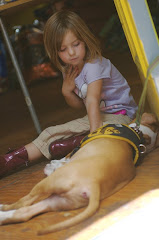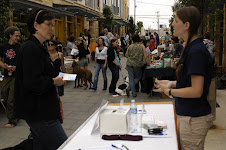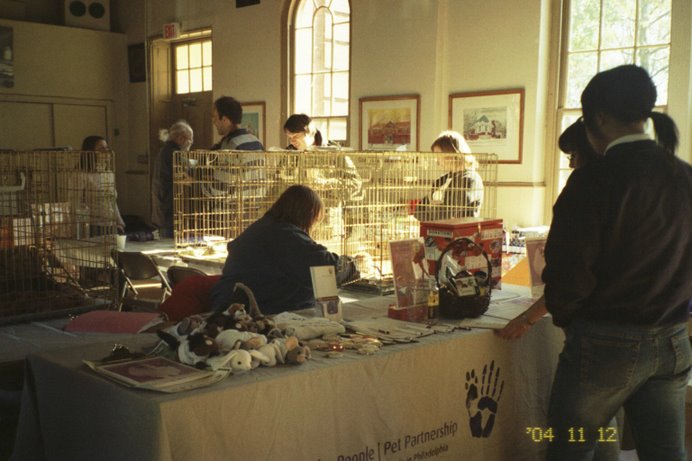Try a little reiki
Alternative medicine for furballs with issues
By Meredith Broussard
For The Inquirer
Harlow Whitleigh spends her days gazing out the window of her Fishtown townhouse, eating bonbons and lounging with her best friend, a Yorkshire terrier named Rosco.
Harlow also barks. A small white bichon frise/poodle hybrid, she barks at cars, at the letter carrier, at birds, at customers coming to nearby Johnny Brenda's tavern, and at anyone walking by on the street.
Jeniphur Whitleigh and Michael Pasquarello, who own Harlow and the Loft District's Cafe Lift, have learned to live with Harlow's high-pitched ways. But when Kimberly Fleisher, the director of the Reiki School & Clinic on South Street, offered to try to reduce Harlow's anxiety with a session of reiki, the restaurateurs were happy to see if the Japanese healing method would calm Harlow down.
"She's always been very anxious. She's overanxious about everything," Pasquarello says, as Harlow races back and forth across the living room in a frenzy, jumping on and off the black leather couch.
In a reiki session, the practitioner lays hands on or above the patient in order to direct "ki," a life-force energy, at the area of difficulty and restore proper energy flow and balance. People use reiki as a complementary therapy to treat numerous conditions, including stress, anxiety, chronic pain, and the side effects of chemotherapy and radiation.
Now reiki for pets is catching on. Just as increasing numbers of pet owners have sought out conventional therapies, such as antidepressants and antianxiety drugs, to treat pet-behavior problems, many are turning to alternative medicine for their pets.
Twenty-one percent of pet owners have used some form of complementary medicine on their pets, according to the American Animal Hospital Association's 2003 National Pet Owner Survey. That's up from the 1996 survey, in which only 6 percent of pet owners said they had used alternative therapies on their pets.
Statistics on the number of pets receiving reiki are not available, though Fleisher reports that the number of requests at the Reiki School & Clinic has increased steadily in the last year. The school offers reiki sessions for $40 in the animal's home, where the pet will be most comfortable.
Harlow's reiki session starts slowly. She perches on her owner's lap, her body tensed and taut, snout thrust out in an anxious pose. Fleisher ignores Harlow at first, instead chatting with the dog's owners and petting Rosco.
It's clear why people turn to Fleisher for stress reduction: With her short dark hair and the erect carriage of the serious yoga-trained, the diminutive 31-year-old radiates a sense of calm.
"If there was one thing that you would want to happen as a result of the reiki, what would it be?" she asks.
"We don't want her to be a different dog. She's our dog, and we love her. But for her own sake, I'd like her to calm down a little bit," Pasquarello says.
Still chatting, Fleisher sits on the floor. Harlow tentatively walks over to sniff her, then dashes across the room, scoots back to hop up on the couch behind Fleisher and buzzes from end to end briefly; Rosco climbs on the couch, too, and the dogs begin to wrestle.
Fleisher often works with terminally ill pets - reiki helps the process of letting go, she says - and often comforts the pet and its owner. One of Fleisher's students, reiki master and health educator Sandi Herman, specializes in pet reiki and animal-bereavement counseling.
Herman has eight cats, all of whom love reiki. "My cats usually know it's reiki time. When I'm working on one, everybody else comes over," says Herman, a Bella Vista resident. "They yawn and get really relaxed."
Stressful events such as veterinarian visits, moving, or the introduction of a new pet to the household are often mentioned as reasons that pet owners seek out reiki to relax their pets.
"Animals are closer to nature than we are. They don't wear clothes; they wear their own fur. They're more in tune with energy and nature," says Bette Hanson, who, along with Chic Petique owner Lindsay Condefer, organizes Philadelphia's annual Natural Pet Expo.
Hanson learned about complementary and alternative medical treatments from the Animal Healing Center in Yardley, which also offers pet reiki. Her dog, Sascha, receives a number of holistic therapies for chronic health problems; she received reiki from Fleisher recently during an informal visit.
"Sascha lay down on her side; it was very natural. She was almost asking for it to be done," Hanson says. The next day, she says, Sascha seemed relaxed - much like a person might the day after a massage.
As with many complementary and alternative medicine treatments, there is controversy over reiki's benefits. "Not every patient is going to respond to every treatment. Make sure it's the right thing for your pet," suggests Christina Fuoco, a veterinarian at Queen Village Animal Hospital. "Every pet is different, so speak to your veterinarian about pursuing complementary medicine."
Owners may want to also want to ask their vet if there are any problems that can result from using reiki to treat a pet, especially in the case of serious illness.
Anyone can perform reiki after taking a class, though there are three levels of training; the highest level, which Fleisher holds, is reiki master.
During Harlow's reiki session, Fleisher and Harlow spend some time sitting alone in the living room. Fleisher waits patiently for Harlow to calm down and sit near her. When Harlow pauses, Fleisher reaches over and starts scratching the dog above her right front leg. The dog is instantly blissful; she lifts her chin for more attention, then sits up on her hind legs, offering her belly to be scratched.
Fleisher centers herself briefly, putting her palms together and closing her eyes. To administer the reiki, Fleisher holds Harlow in her lap and cups her hand over the dog's head, passing it back and forth about two inches above Harlow's curly white mop. Fleisher centers most of her attention on Harlow's head; the dog seems to be asking for the reiki there, Fleisher says, as well as on a spot low on her spine.
When her owners return, Harlow greets them leisurely - none of the frantic barking or jumping seen earlier. The dog's face is relaxed, her tongue hanging out, her ears droopy.
"She's warm," Whitleigh comments as she scoops up the dog at the end of the session. Reiki practitioners report that their hands become extremely warm during sessions - Fleisher recalls doing reiki on a fish once, and her hands left sweaty prints on the bowl when she was done.
As Fleisher prepares to leave, Harlow is significantly calmer. She ambles off to take a nap. Is it the reiki, or has she calmed down due to familiarity with the visitor? Hard to say.
But one thing is clear: she isn't barking.
Wednesday, July 18, 2007
Subscribe to:
Post Comments (Atom)



























No comments:
Post a Comment